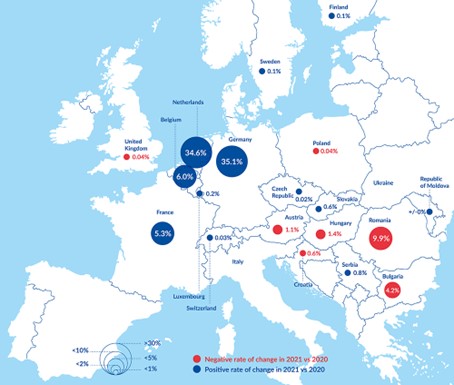Sustainable freight forwarding – inland navigation
Main Article Content
Abstract
Inland navigation plays a crucial role in goods transport, facilitating the movement of goods via rivers and canals. Sustainability in Goods transport involves reducing environmental impact, promoting social responsibility, and enhancing efficiency. Sustainability in goods transport includes optimising transportation routes, investing in fuel-efficient vehicles, and promoting alternative fuels. Green technologies such as GPS tracking and route optimisation software can improve efficiency. Encouraging sustainable packaging materials and carbon offsetting can further reduce environmental impact. Inland navigation can be greener by adopting alternative fuels, improving vessel efficiency, and optimising routes. Maintenance and modernisation of infrastructure, environmental protection measures, and modal shifts from road transport also contribute to sustainability. Various factors influence the performance of inland navigation, including infrastructure, water levels, vessel characteristics, regulations, economic conditions, technological advancements, environmental factors, and social considerations. Integrating sustainable practices and addressing these factors can lead to a more environmentally friendly and efficient goods water transport system. This paper investigates the connections between inland goods transport and sustainability, identifying the main factors. Some basic statistics were collected and analysed to show the performance of inland navigation. The analysis showed that inland navigation is very diverse in Europe, Western Europe is more developed than Eastern European countries. In conclusion, it can be stated that many factors influence the development of Eastern European inland navigation.
Article Details

This work is licensed under a Creative Commons Attribution-NonCommercial-ShareAlike 4.0 International License.
Authors retain copyright and grant the journal right of first publication with the work simultaneously licensed under a Creative Commons Attribution License that allows others to share the work with an acknowledgement of the work's authorship and initial publication in this journal.
Authors are able to enter into separate, additional contractual arrangements for the non-exclusive distribution of the journal's published version of the work (e.g., post it to an institutional repository or publish it in a book), with an acknowledgement of its initial publication in this journal.
Authors are permitted and encouraged to post their work online (e.g., in institutional repositories or on their website) prior to and during the submission process, as it can lead to productive exchanges, as well as earlier and greater citation of published work (See The Effect of Open Access). As soon as the paper is accepted, finally submitted and edited, the paper will appear in the "OnlineFirst" page of the journal, thus from this point no other internet-based publication is necessary.
References
Central Commission for the Navigation of the Rhine (2022). Annual Report 2022 URL: https://inland-navigation-market.org/chapitre/2-freight-transport-on-inland-waterways-2/?lang=en (last visit: 2024.03.14.)
Eurostat (2022): Databrowser URL: https://ec.europa.eu/eurostat/databrowser/view/iww_go_atygo__custom_10583440/default/map?lang=en (last vist: 2024.03.15.)
Károlyfi, K. A., Szalai, D., Szép, J., & Horváth, T. (2021). Integration of BIM in architecture and structural engineering education through common projects. Acta Technica Jaurinensis, 14(4), 424-439. DOI: https://doi.org/mn3s
Lavuri, R., Roubaud, D., Grebinevych, O. (2023). Sustainable consumption behaviour: Mediating role of pro-environment self-identity, attitude, and moderation role of environmental protection emotion. Journal of Environmental Management. 347, 119106. DOI: https://doi.org/mmct
Ma, M., Zhang, F., Liu, W., Dixit, V. (2023). On urban co-modality: Non-cooperative and cooperative games among freight forwarder, carrier and transit operator. Transportation Research Part C: Emerging Technologies. 153, 104234. DOI: https://doi.org/mmcs
Majerčák, J., Kurenkov, P. V., Ostashevskaya, O. (2024). A Systematic Approach to the Design of Logistics Solutions and a Methodology for their Evaluation in the Field of Greening Freight Transport. Transportation Research Procedia. 77, 193–200. DOI: https://doi.org/mmcw
Mancino D. (2023): High-value datasets – mobility in the EU. EUROSTAT. URL: https://data.europa.eu/en/publications/datastories/high-value-datasets-mobility-eu-3
Maternová, A., Materna, M., Dávid, A. (2022). Revealing causal factors influencing sustainable and safe navigation in central Europe. Sustainability. 14(4), 2231. DOI: https://doi.org/mmsb
Maternová, A., Materna, M., Dávid, A., Török, A., Švábová, L. (2023). Human error analysis and fatality prediction in maritime accidents. Journal of Marine Science and Engineering. 11(12), 2287. DOI: https://doi.org/mmr7
Naumov, V. (2018). Modeling demand for freight forwarding services on the grounds of logistics portals data. Transportation Research Procedia. 30, 324–331. DOI: https://doi.org/mmcr
Nilsson, R., Gärling, T., Lützhöft, M. (2009). An experimental simulation study of advanced decision support system for ship navigation. Transportation research part F: traffic psychology and behaviour. 12(3), 188–197. DOI: https://doi.org/cjjb3t
Palomba, V., Aprile, M., Motta, M., Vasta, S. (2017). Study of sorption systems for application on low-emission fishing vessels. Energy. 134, 554–565. DOI: https://doi.org/mmcx
Savu, S. V., Marin, R. C., David, A., Olei, A. B., Dumitru, I., Tarnita, D., Maternova, A., Savu, I. D. (2022). Reducing NOx emissions through microwave heating of aftertreatment systems for sustainable transport in the inland waterway sector. Sustainability. 14(7), 4156. DOI: https://doi.org/mmr9
Scholz, J., Dilger, L. J., Friedmann, M., Fleischer, J. (2023). A Methodology for Sustainability Assessment and Decision Support for Sustainable Handling Systems. Procedia CIRP. 116, 47–52. DOI: https://doi.org/mmcv
Upadhyay, R. K., Gupta, J., Khobragade, V. J. (2024). Enhancing Multimodal Transportation in India: Jogighopa Multimodal Logistics Park. In Intelligent Transportation System and Advanced Technology (pp. 123-157). Singapore: Springer Nature Singapore. DOI: https://doi.org/mn3p
Zalacko, R., Zöldy, M., Simongáti, G. (2020). Comparative study of two simple marine engine BSFC estimation methods. Brodogradnja. 71(3), 13–25. DOI: https://doi.org/hb7z





